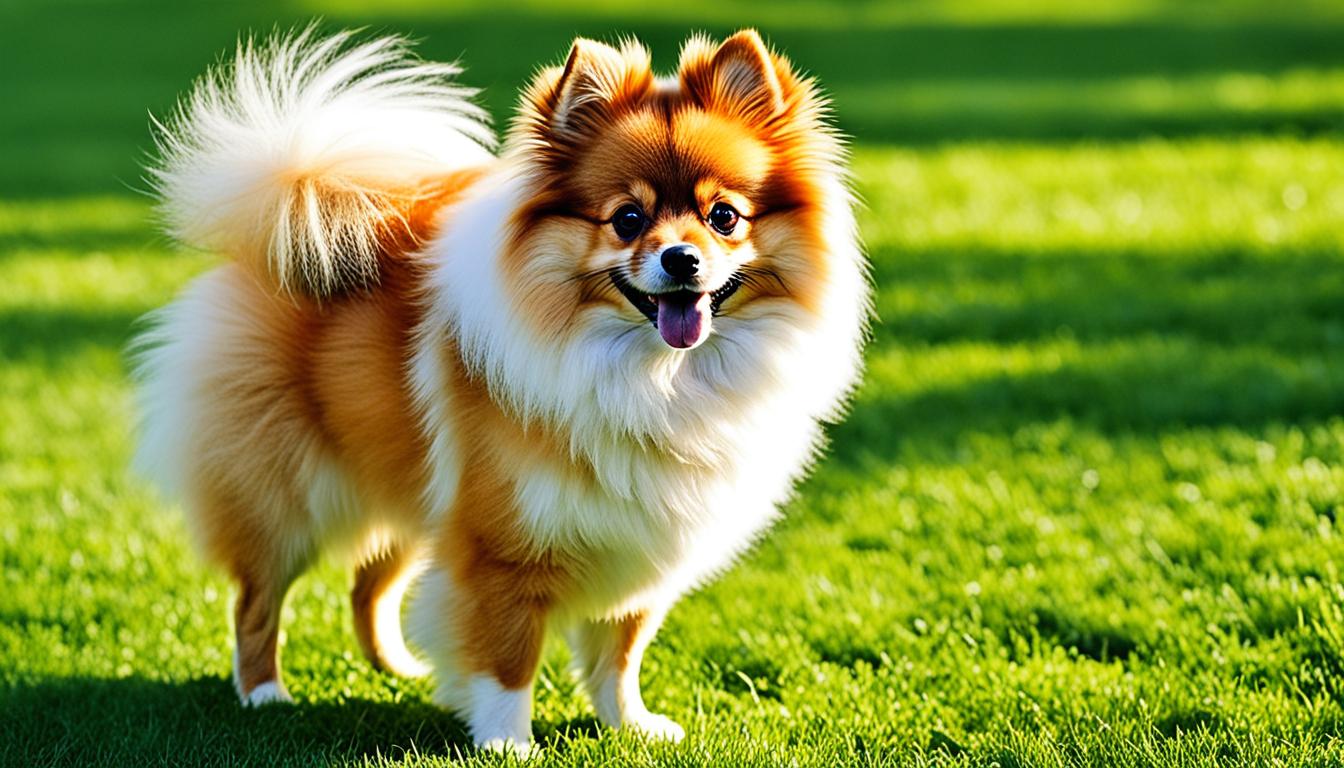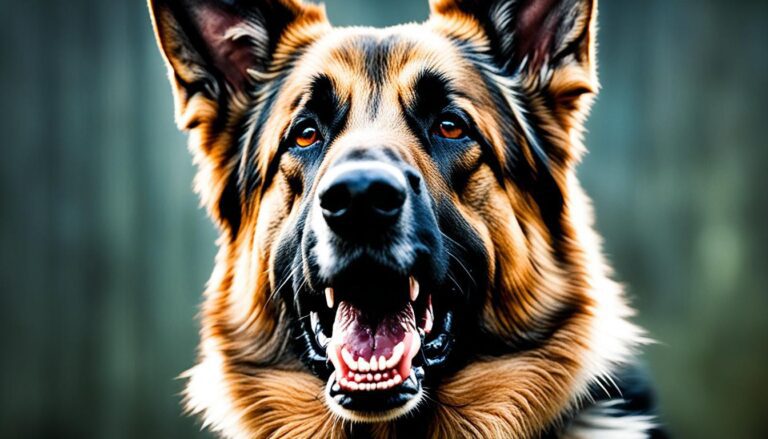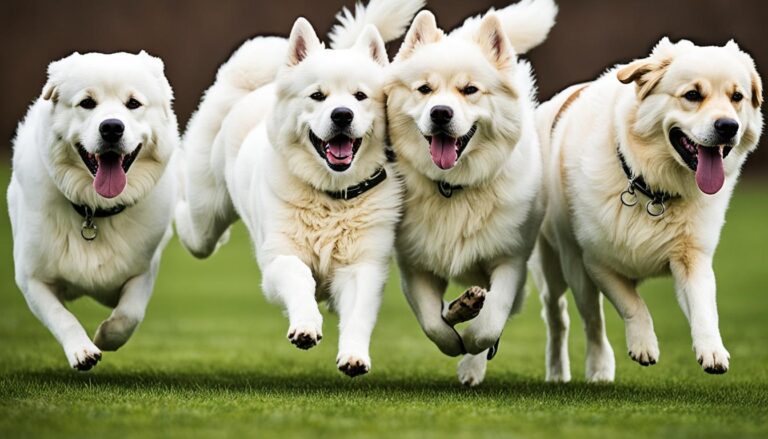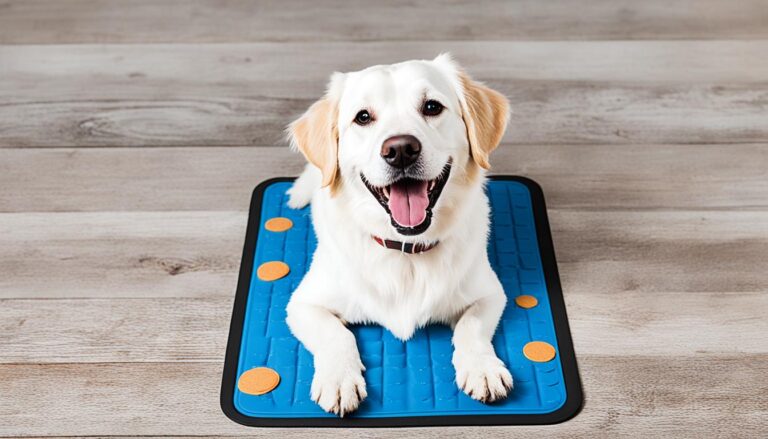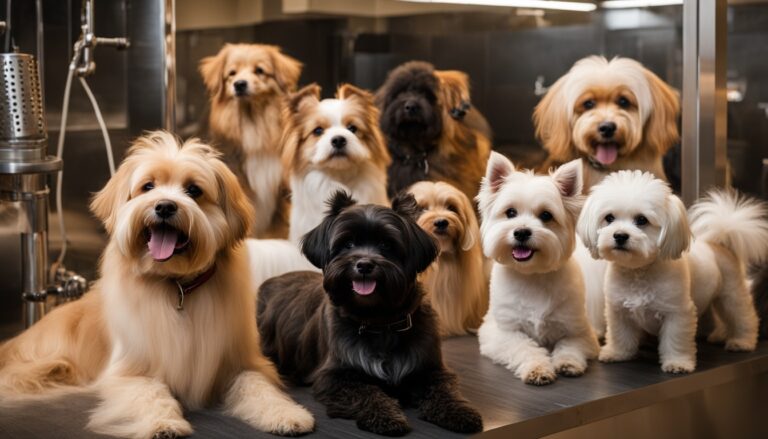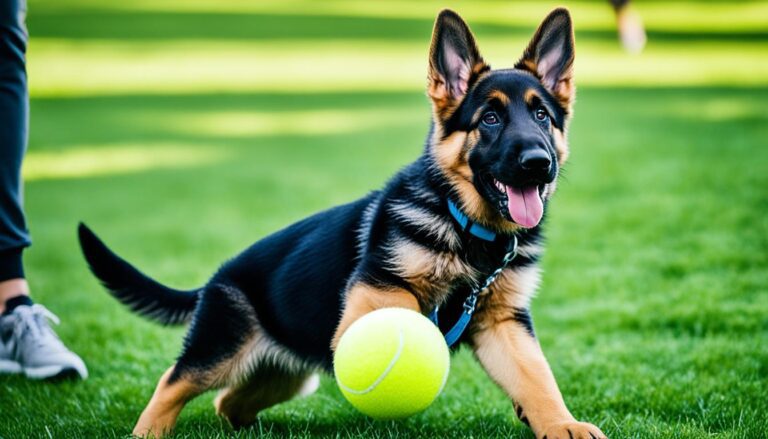Complete Pomeranian Full Description & Traits
Did you know that the Pomeranian is not only a beloved breed, but also one of the most popular toy dog breeds in the United States? With their adorable appearance and lively personality, it’s no wonder these little dogs have won the hearts of so many dog lovers. If you’re curious to learn more about the Pomeranian breed characteristics and what makes them truly special, we’ve got you covered.
Key Takeaways:
- The Pomeranian is a small toy dog breed known for their perky and friendly nature.
- They have an ideal height of 8 to 11 inches and a weight of 3 to 7 pounds.
- Pomeranians have a medium-length double coat that comes in various colors and patterns.
- They are intelligent and can excel in obedience competitions with proper training.
- Pomeranians require moderate grooming to maintain a healthy and shiny coat.
Pomeranian Size and Weight
The Pomeranian is a small dog breed, known for its petite size and adorable appearance. With an ideal weight ranging from three to seven pounds and a shoulder height of eight to 11 inches, Pomeranians are one of the smallest toy breeds available. Their compact stature makes them easy to handle and perfect for individuals or families looking for a portable and affectionate companion.
Despite their small size, Pomeranians possess a vibrant personality that brings joy and liveliness to any home. Their compact build allows them to fit comfortably in various living spaces, making them suitable for apartments, condos, or houses with limited space.
“The Pomeranian may be small, but they are big in heart. Their size and weight make them easily manageable and highly adaptable to different living situations.” – Pomeranian enthusiast
Pomeranian Temperament and Behavior
Pomeranians are known for their remarkable temperament and behavior. These perky and friendly dogs possess a confident and inquisitive nature, always ready to explore their surroundings. With their small size, Pomeranians are not aware of their limitations and may even display a fearless attitude, sometimes challenging larger dogs.
Intelligence is another trait that sets Pomeranians apart. They have an independent streak but can excel in obedience competitions with proper training. Their curious and alert expression reflects their active and alert minds, always eager to learn and engage with their environment.
As Pomeranians age, they become more amenable to being lap dogs, appreciating the warmth and comfort of close human contact. However, it’s important to note that due to their small size, supervision is necessary when they interact with children to prevent accidental injuries.
Overall, Pomeranians are energetic and lively companions, bringing joy and vibrancy to their families’ lives. Their loving and loyal nature makes them excellent companions for individuals and families alike. It’s crucial to provide them with proper training, mental stimulation, and socialization to ensure a happy and well-rounded Pomeranian.
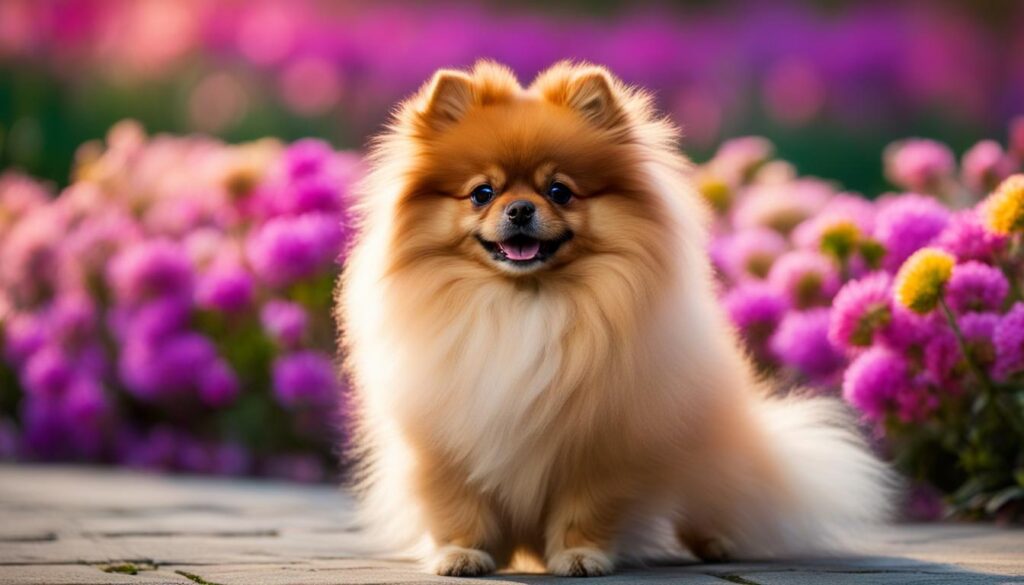
Some key attributes of Pomeranians’ temperament and behavior include:
- Perky and friendly nature
- Confident and inquisitive
- Fearless attitude
- Intelligent with an independent streak
- Curious and alert expression
- Becomes more amenable to being a lap dog as they age
- Good with children when supervised
Pomeranian Grooming Tips
Grooming is an essential aspect of caring for your Pomeranian. Their medium length double coat requires regular attention to keep it in the best condition. Here are some grooming tips to help you maintain your Pomeranian’s coat and overall hygiene:
Brushing
Regular brushing is crucial for Pomeranians to prevent matting and keep their coat healthy and shiny. Aim to brush your Pomeranian’s coat at least once or twice a week. During shedding seasons, which usually occur twice a year, more frequent brushing is necessary to manage the increased amount of loose hair. Use a slicker brush or a comb designed specifically for Pomeranians to gently remove tangles and keep their fur looking great.
Trimming
Occasional trimming may be necessary to maintain a neat appearance for your Pomeranian. Focus on areas such as the paws, hocks, and behind the ears, where hair tends to grow longer. Use caution when trimming to avoid nicking your Pomeranian’s skin. If you are not confident in your trimming skills, it’s best to seek professional help from a groomer.
Dental Care
Pomeranians are prone to dental problems, so proper dental care is crucial. Regularly brush your Pomeranian’s teeth with a canine toothbrush and toothpaste formulated specifically for dogs. This helps prevent plaque buildup, gum disease, and bad breath. Additionally, provide dental chews or toys that promote good oral hygiene.
Nail Trimming
Regular nail trimming is important to keep your Pomeranian’s paws healthy and prevent discomfort. Trim their nails every 2-3 weeks, or as needed, taking care not to cut into the quick, which can cause bleeding. If you’re not familiar or comfortable with nail trimming, consult a professional groomer or your veterinarian.
Ear Cleaning
Keep your Pomeranian’s ears clean and free from wax and debris. Gently wipe the outer ear with a damp cloth or use a veterinarian-recommended ear cleaning solution. Avoid inserting anything into the ear canal to prevent injury. If you notice any signs of ear infection, such as redness, swelling, or discharge, consult your veterinarian.
By following these grooming tips, you can ensure that your Pomeranian looks and feels their best. Remember to be patient and gentle during grooming sessions to make it a positive experience for your furry friend.
Pomeranian Health Issues
While Pomeranians are generally healthy dogs, it’s important to be aware of the potential health issues that they may be prone to. By understanding and addressing these concerns, you can ensure the well-being of your Pomeranian.
Luxating Patellas (Kneecap Problems)
One common health issue in Pomeranians is luxating patellas, also known as kneecap problems. This occurs when the kneecap slips out of its normal position, causing discomfort and mobility issues. Regular veterinary check-ups can help detect early signs of this condition. In severe cases, surgical intervention may be necessary to correct the problem.
Intervertebral Disc Disease (IVDD)
Another health concern for Pomeranians is intervertebral disc disease (IVDD). This condition affects the spine and can lead to pain, weakness, and even paralysis in severe cases. Regular exercise and weight management can help reduce the risk of IVDD. If symptoms are noticed, prompt veterinary attention is essential for proper diagnosis and treatment.
Hypothyroidism
Hypothyroidism is a hormonal disorder that can affect Pomeranians. It occurs when the thyroid gland fails to produce enough thyroid hormone, leading to a range of symptoms such as weight gain, hair loss, and lethargy. Regular blood tests can help diagnose this condition, and treatment generally involves lifelong thyroid hormone replacement therapy.
To keep your Pomeranian healthy, it’s important to schedule regular check-ups with your veterinarian, follow a balanced diet tailored to their specific needs, and provide them with proper exercise and mental stimulation. By taking proactive measures and being aware of potential health issues, you can help prevent and manage these conditions, ensuring a long and happy life for your beloved Pomeranian.
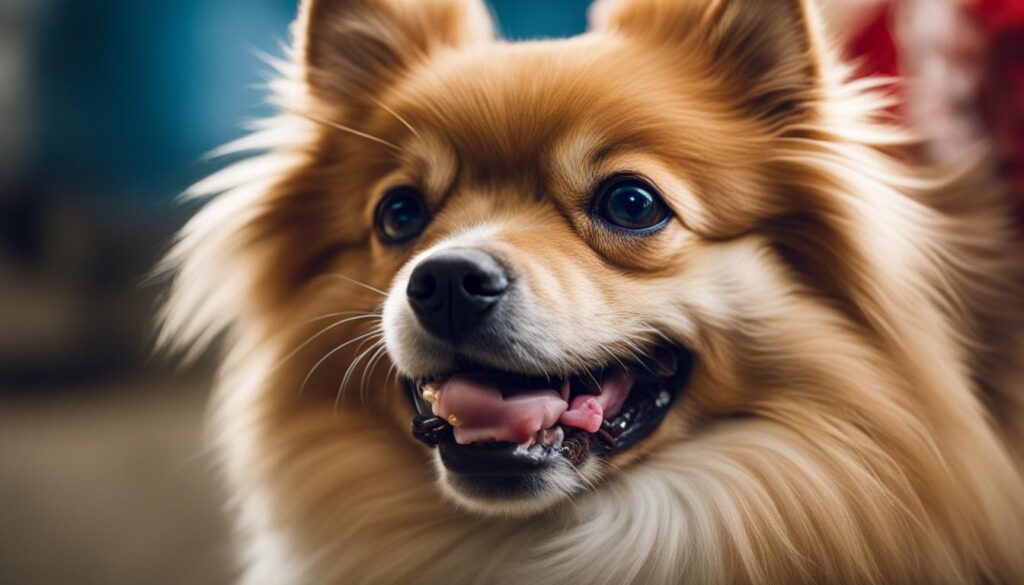
| Health Issues | Description |
|---|---|
| Luxating Patellas (Kneecap Problems) | The kneecap slips out of its normal position, causing discomfort and mobility issues. |
| Intervertebral Disc Disease (IVDD) | Affects the spine and can lead to pain, weakness, and paralysis in severe cases. |
| Hypothyroidism | Thyroid gland fails to produce enough thyroid hormone, leading to various symptoms. |
Pomeranian Training Guide
Training a Pomeranian can be a rewarding experience, as these dogs are intelligent and eager to please. With the right approach, you can teach your Pomeranian obedience, basic commands, and proper social etiquette. Here are some tips to guide you in training your Pomeranian:
- Use positive reinforcement: Pomeranians respond well to positive reinforcement methods. Reward-based training, such as treats or praise, can motivate your Pomeranian to learn and follow commands.
- Start early socialization: Early socialization is crucial for Pomeranians. Expose your puppy to different people, animals, and environments to ensure they grow up to be well-rounded and good-natured dogs.
- Focus on obedience: Teach your Pomeranian basic obedience commands like sit, stay, and come. Consistency and patience are key when training these commands.
- Establish boundaries: Pomeranians can have a bit of an independent streak. Set clear boundaries and establish yourself as the leader to prevent any behavioral issues.
“Training a Pomeranian requires patience, consistency, and positive reinforcement methods.”
Remember to keep training sessions short and engaging to avoid overwhelming your Pomeranian. Use praise and rewards to reinforce good behavior and avoid punishment-based training methods.
Pomeranian Training Schedule
Creating a training schedule can help you stay consistent and organized in your Pomeranian’s training. Here’s a sample training schedule you can follow:
| Training Session | Duration | Focus |
|---|---|---|
| Morning Session | 10 minutes | Basic obedience commands (sit, stay, come) |
| Afternoon Session | 10 minutes | Focus on leash training and walking nicely on a leash |
| Evening Session | 10 minutes | Engage in interactive play and mental stimulation activities |
Remember to adapt the training schedule to your Pomeranian’s individual needs and energy levels. Consistency and positive reinforcement are key to successful training.
Pomeranian Exercise Needs
Pomeranians are energetic dogs despite their small size and require regular exercise to keep them happy and healthy. While they don’t need excessive exercise, they should have at least 20 minutes of daily physical activity. This can include short walks or playtime in a fenced yard. Physical exercise not only helps to maintain their weight but also improves their cardiovascular health and muscle tone.
In addition to physical exercise, mental stimulation is crucial for Pomeranians. These intelligent dogs thrive on mental challenges and enjoy interactive toys and games. Puzzle toys and treat-dispensing toys can keep them mentally sharp and prevent boredom. Engaging their minds helps prevent destructive behaviors that can result from pent-up energy.
“Regular exercise is essential for Pomeranians as it helps burn off excess energy and prevents them from becoming overweight. It also enhances their overall well-being and reduces the risk of certain health issues.” – Dr. Jane Thompson, Veterinarian
It is important to note that Pomeranians are sensitive to extreme weather conditions. During hot weather, it’s best to exercise them during cooler times of the day to prevent overheating. In cold weather, it’s advisable to dress them in a dog sweater or coat to keep them warm. Safety should always be a priority during outdoor exercise, including the use of a properly fitted harness and a secure leash.
| Exercise Guidelines for Pomeranians | Frequency | Duration |
|---|---|---|
| Moderate-intensity exercise | Daily | 20 minutes |
| Mental stimulation activities | Daily | 10-15 minutes |
| Playtime with interactive toys | Daily | 10-15 minutes |
Regular exercise and mental stimulation are vital for maintaining the overall health and well-being of Pomeranians. By providing them with the right amount of physical and mental activity, you can ensure that they lead happy and fulfilling lives.
Pomeranian Care Tips
Along with regular grooming and exercise, there are other care tips to keep your Pomeranian happy and thriving. Here are some essential tips to ensure the well-being of your beloved Pomeranian:
Nutritious Diet
Providing a nutritious diet suitable for your Pomeranian’s age and size is essential for their overall health. Consult with your veterinarian to determine the best diet plan and portion sizes to maintain a healthy weight and meet their nutritional needs.
Dental Hygiene
Maintaining proper dental hygiene is crucial for your Pomeranian’s oral health. Regular teeth brushing using a dog-specific toothbrush and toothpaste or providing dental treats can help prevent dental issues such as tartar buildup and gum disease.
Vet Check-Ups and Vaccinations
Regular veterinary check-ups are vital to monitor your Pomeranian’s health and catch any potential issues early on. Vaccinations are essential to protect against common diseases and ensure their immunity is strong. Follow your veterinarian’s recommended vaccination schedule.
Preventive Measures Against Parasites
Protect your Pomeranian from parasites such as fleas, ticks, and worms by using preventive medications recommended by your veterinarian. Regularly check your Pomeranian’s coat for any signs of infestation, and promptly address any issues that arise.
By following these care tips, you can provide the best care for your Pomeranian and ensure they lead a healthy and happy life.
Conclusion
The Pomeranian is a remarkable breed known for its small size, intelligence, and lively personality. These adorable dogs make fantastic companions for individuals and families alike, but they do require proper care and attention to thrive.
To ensure the well-being of your Pomeranian, it is important to prioritize moderate grooming, which includes regular brushing to keep their coat healthy and prevent matting. Occasional trimming may also be necessary to maintain a neat appearance.
Additionally, providing regular exercise is crucial for Pomeranians. Though they are small dogs, they have a surprising amount of energy. Daily walks and playtime not only keep them physically fit but also mentally stimulated.
Proper training is another important aspect of Pomeranian care. These intelligent dogs are eager to please, making them relatively easy to train. Using positive reinforcement methods and early socialization will help them become well-rounded and obedient pets.
Remember, Pomeranians are loving and loyal companions. With the right care, they will provide you with years of joy and companionship. If you’re considering adding a Pomeranian to your family, be prepared to offer them the love, attention, and care they deserve.
FAQ
What is the full description of a Pomeranian?
The Pomeranian is a small toy dog breed, typically weighing between three to seven pounds and standing at a height of eight to 11 inches. They have upright ears, a medium-length coat, and come in various colors and patterns. These perky and friendly dogs have a confident and lively personality, making them an ideal companion.
What is the size and weight of a Pomeranian?
The Pomeranian is one of the smallest toy breeds, with an ideal weight range of three to seven pounds and a height of eight to 11 inches at the shoulder.
What is the temperament and behavior of a Pomeranian?
Pomeranians are generally perky, friendly, and energetic dogs. Despite their small size, they have a confident and inquisitive nature. They are intelligent and may exhibit a bit of an independent streak, but with proper training, they can excel in obedience. Pomeranians can be good with children but should be supervised due to their small size.
What are some grooming tips for Pomeranians?
Pomeranians have a medium-length double coat that requires regular grooming. They should be brushed at least once or twice a week, and more frequently during shedding season to prevent matting. Occasional trimming may be needed to maintain a neat appearance. Other grooming needs include dental care, nail trimming, and ear cleaning.
What are some common health issues for Pomeranians?
Pomeranians are generally healthy, but they may be prone to certain health issues. Some common ones include luxating patellas (kneecap problems), intervertebral disc disease (IVDD), and hypothyroidism. Regular vet check-ups, a balanced diet, and proper exercise can help prevent and manage these health issues.
How can I train a Pomeranian?
Pomeranians are intelligent and eager to please, making them relatively easy to train. Positive reinforcement methods, such as reward-based training, work best with this breed. Early socialization is important to ensure they grow up to be well-rounded dogs. Training should focus on obedience, basic commands, and proper social etiquette.
What are the exercise needs of a Pomeranian?
Pomeranians are energetic dogs despite their small size. They require regular exercise to keep them happy and healthy. At least 20 minutes of daily physical activity, such as walks or playtime, is recommended. Mental stimulation through interactive toys and games is also important for their mental well-being.
What are some care tips for Pomeranians?
Along with regular grooming and exercise, Pomeranians require a nutritious diet suitable for their age and size. Dental hygiene, including regular teeth brushing or dental treats, should be maintained. Regular vet check-ups, vaccinations, and preventive measures against parasites are also crucial for their overall health and well-being.
What conclusion can be drawn about Pomeranians?
Pomeranians are small, intelligent, and lively dogs with a loving and loyal nature. They require moderate grooming, regular exercise, and proper training to ensure their well-being. With the right care, Pomeranians can make wonderful companion dogs for individuals and families alike.

